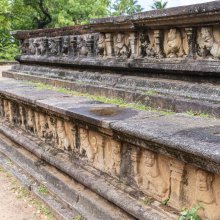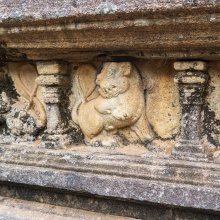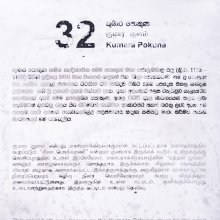Nandana, Nandanā, Nāndana, Namdana: 39 definitions
Introduction:
Nandana means something in Buddhism, Pali, Hinduism, Sanskrit, Jainism, Prakrit, the history of ancient India, Marathi. If you want to know the exact meaning, history, etymology or English translation of this term then check out the descriptions on this page. Add your comment or reference to a book if you want to contribute to this summary article.
Nandana has 37 English definitions available.
Images (photo gallery)
Languages of India and abroad
Sanskrit dictionary
[Deutsch Wörterbuch]
Source: Cologne Digital Sanskrit Dictionaries: Böhtlingk and Roth Grosses Petersburger WörterbuchNandana (नन्दन):—(vom caus. von nand) [Pāṇini’s acht Bücher 3, 1, 134.] [Vopadeva’s Grammatik 26, 29.] das anlautende na wird im comp. niemals ṇa nach gaṇa kṣubhnādi zu [Pāṇini’s acht Bücher 8, 4, 39.]
1) adj. f. ā (vgl. [Pāṇini’s acht Bücher 7, 1, 1,] [Scholiast 7, 3, 44,] [Scholiast]) erfreuend [Hemacandra’s Anekārthasaṃgraha 3, 385.] [Medinīkoṣa Nalopākhyāna 80.] puṣpamanuttamam manaso mama nandanam [Mahābhārata 3, 11073. 7, 3937.] manohṛdaya [3, 11564. 1, 4786.] [Hiḍimbavadha 1, 42.] [Rāmāyaṇa 4, 26, 21.] [Varāhamihira’s Bṛhajjātaka S. 8, 47.] [Hitopadeśa I, 68. II, 6.] kulanandana [Vetālapañcaviṃśati] in [Lassen’s Anthologie 1, 15.] kulanandanā [Pañcatantra 187, 4.] —
2) m. a) Sohn (den als Vater —, die als Mutter erfreuend) [Trikāṇḍaśeṣa 3, 3, 244. fg.] [Hemacandra’s Abhidhānacintāmaṇi 541.] [Hemacandra’s Anekārthasaṃgraha] [Medinīkoṣa] rāja [Yājñavalkya’s Gesetzbuch 1, 274.] pāṇḍu [Hiḍimbavadha 1, 4. 4, 56.] [Nalopākhyāna 20, 13.] mādri (mit verkürztem Auslaute des Versmaasses wegen) [Mahābhārata 2, 1116. 3, 19.] rukmiṇi [708.] rājarṣi [Rāmāyaṇa Gorresio 2, 120, 16.] [Raghuvaṃśa 3, 41.] [Bhāgavatapurāṇa 4, 24, 79.] nandanā f. Tochter [Hemacandra’s Abhidhānacintāmaṇi 542.] — b) Beiname Viṣṇu’s (der Erfreuer) [Mahābhārata 13, 7005.] — c) Beiname Śiva’s [Mahābhārata 13, 1189.] — d) Frosch (vgl. nandaka) [Śabdaratnāvalī im Śabdakalpadruma] — e) eine best. Pflanze mit giftiger Frucht [Hemacandra’s Abhidhānacintāmaṇi 1197] (nach dem Schol. m. f.). [Suśruta 2, 251, 19.] — f) Nomen proprium eines Wesens im Gefolge des Skanda [Mahābhārata 9, 2540.] — g) Nomen proprium eines Siddha [Bhāgavatapurāṇa 4, 6, 34.] — h) Nomen proprium einer buddh. Gottheit [Rgva tch’er rol pa 7] (hier hat die ed. Calc. nanda). [?8 (ed. Calc. 6, 19). 401.] — i) bei den Jaina Nomen proprium des 7ten unter den 9 weissen Bala [Hemacandra’s Abhidhānacintāmaṇi 698.] — k) Nomen proprium eines Berges [Bhāgavatapurāṇa 5, 20, 21.] [Kalikāpurāṇa 81] [Śabdakalpadruma] — l) Name des 26sten Jahres im 60 jährigen Jupitercyclus [Varāhamihira’s Bṛhajjātaka S. 8, 38.] — m) Name einer best. Tempelform [Varāhamihira’s Bṛhajjātaka S. 55, 17.] nandana iti ṣaḍbhauma dvātriṃśat (hastān) ṣoḍaśāṇḍayutaḥ 22. —
3) n. a) Nomen proprium eines Haines der Götter (insbes. Indra's) [Amarakoṣa 1, 1, 1, 41.] [Trikāṇḍaśeṣa 1, 1, 61. 3, 3, 244.] [Hemacandra’s Abhidhānacintāmaṇi 178.] [Hemacandra’s Anekārthasaṃgraha] [Medinīkoṣa] [Mahābhārata 3, 3065. 10958. 5, 352. 7, 2127. 13, 4865.] [Nalopākhyāna 26, 34.] [Indralokāgamana 2, 3.] [Arjunasamāgama 4, 45.] [Harivaṃśa 7462. 7468. 8948.] [Rāmāyaṇa 2, 91, 43 (Gorresio 100, 44). 74 (Gorresio 100, 75). 99, 10. 3, 49, 32. 6, 95, 21.] [Rgva tch’er rol pa 33. 56. 83.] [Kathāsaritsāgara 9, 20.] [Viṣṇupurāṇa 169.] [Bhāgavatapurāṇa 3, 23, 40. 5, 16, 15.] drumāḥ [Kumārasaṃbhava 2, 41.] vana [Rāmāyaṇa 1, 14, 33.] Vgl. nāndana. — b) Nomen proprium eines Schwertes (asiratna) [Rāmāyaṇa 1, 29, 14]; vgl. nandaka 2,b. — c) Name eines Metrums (4 Mal ˘ ˘ ˘ ˘ ¯ ˘ ¯ ˘ ˘ ˘ ¯ , ˘ ¯ ˘ ¯ ¯ ˘ ¯) [COLEBR.] Misc. Ess. [II, 162 (XIII, 11).] — d) nom. act. das Erfreuen oder Freude (vom simpl.): durhṛdāmapraharṣāya suhṛdāṃ nandanāya ca [Mahābhārata 2, 988.]
--- OR ---
Nāndana (नान्दन):—(von nand oder nandana) n. Freudenort, Paradies: pā.a.ā.īḥ sva.tyayanī.tābhirgacchati nānda.am [Sāmaveda II, 5, 2, 8, 6.] [Aitareyopaniṣad 3, 12.]
--- OR ---
Nandana (नन्दन):—
2) a) überh. Nachkomme, z. B. bhṛgu [Lassen’s Anthologie (II) 92, 12.] — l) [WEBER, Jyotiṣa 99.] [Oxforder Handschriften 331,b,2 v. u.]
--- OR ---
Nandana (नन्दन):—m. ein best. musikalischer Kunstausdruck; s. u. 4. vāsaka .
Source: Cologne Digital Sanskrit Dictionaries: Sanskrit-Wörterbuch in kürzerer FassungNandana (नन्दन):——
1) Adj. (f. ā) erfreuend. —
2) m. — a) am Ende eines Comp. Sohn , Nachkommen. — b) Beiname — α) Viṣṇu's. — β) Śiva’s ; vgl. [VP.².1,79.] — c) *Frosch. — d) eine best. Pflanze mit giftiger Frucht. Auch *f. — e) eine best. Tempeloder Kiosk-Form [Viśvakarma’s Vāstuvidyā 832.] — f) ein best. Tact [Saṃgitasārasaṃgraha 210.] — g) das 26ste Jahr im 60jährigen Jupitercyclus. — h) Nomen proprium — α) eines Wesens im Gefolge Skanda's. — β) eines Siddha. — γ) einer buddh. Gottheit. — δ) *bei den Jaina des 7ten unter den 9 weissen Bala. — ε) eines Berges. —
3) f. ā Tochter. —
4) n. — a) Freude , Wonne. — b) das Erfreuen [Tejobindūpaniṣad 8.] — c) ein best. Metrum. — d) Nomen proprium — α) eines Hains der Götter , insbes. Indra's. — β) eines Schwertes.
--- OR ---
Nāndana (नान्दन):—n. Freudenort , Paradies.
Sanskrit, also spelled संस्कृतम् (saṃskṛtam), is an ancient language of India commonly seen as the grandmother of the Indo-European language family (even English!). Closely allied with Prakrit and Pali, Sanskrit is more exhaustive in both grammar and terms and has the most extensive collection of literature in the world, greatly surpassing its sister-languages Greek and Latin.
See also (Relevant definitions)
Starts with (+7): Nandana bhatta, Nandana mishra, Nandana Parivena, Nandana Pokkharani, Nandana Sutta, Nandana Vagga, Nandanadruma, Nandanagara, Nandanagiri, Nandanaja, Nandanaka, Nandanakanana, Nandanamala, Nandananaga, Nandanandana, Nandanandanashtaka, Nandanandani, Nandanandini, Nandananripa, Nandananripakatha.
Ends with (+116): Abdhinamdana, Abhinandana, Aditinandana, Agnisimhanandana, Ahalyanandana, Ahinamdana, Amritanandana, Anabhinandana, Anandana, Anandanandana, Arinandana, Arkanandana, Aryamanandana, Ashvasenanripanandana, Asipatranamdana, Balinandana, Bhaganandana, Bhanandana, Bhandiravananandana, Bhatta sunandana.
Full-text (+320): Nandanavana, Aditinandana, Devakinandana, Kashyapanandana, Raghunandana, Shambhunandana, Arkanandana, Daivakinandana, Kausalyanandana, Parvatinandana, Arinandana, Balinandana, Gadhinandana, Nandanadruma, Nandanamala, Shakranandana, Shrinandana, Nandanandana, Varnabhidhana, Yadunandana.
Relevant text
Search found 86 books and stories containing Nandana, Nandanā, Nāndana, Namdana, Ṇaṃdaṇa, Ṇandaṇa, Ṇaṃdaṇā, Ṇandaṇā, Naṃdana, Nāṇdāṇa; (plurals include: Nandanas, Nandanās, Nāndanas, Namdanas, Ṇaṃdaṇas, Ṇandaṇas, Ṇaṃdaṇās, Ṇandaṇās, Naṃdanas, Nāṇdāṇas). You can also click to the full overview containing English textual excerpts. Below are direct links for the most relevant articles:
Garga Samhita (English) (by Danavir Goswami)
Verses 2.10.11-13 < [Chapter 10 - Description of Śrī Kṛṣṇa’s Herding the Cows]
Verse 3.2.10 < [Chapter 2 - The Great Festival of Śrī Girirāja]
Verse 5.19.22 < [Chapter 19 - The Festival on Śrī Kṛṣṇa Return]
Brihad Bhagavatamrita (commentary) (by Śrī Śrīmad Bhaktivedānta Nārāyana Gosvāmī Mahārāja)
Verse 2.4.110 < [Chapter 4 - Vaikuṇṭha (the spiritual world)]
Verse 1.7.122 < [Chapter 7 - Pūrṇa (pinnacle of excellent devotees)]
Verse 1.1.70-72 < [Chapter 1 - Bhauma (the earthly plane)]
Maha Prajnaparamita Sastra (by Gelongma Karma Migme Chödrön)
Appendix 8 - The four gardens of the Trāyastriṃśa gods < [Chapter XIV - Emission of rays]
Act 5.4: The softening of the earth makes beings joyful < [Chapter XIV - Emission of rays]
Appendix 1 - The temptation of Anuruddha (visit of the Manāpakāyikā-devatās) < [Chapter XVII - The Virtue of Generosity]
Sahitya-kaumudi by Baladeva Vidyabhushana (by Gaurapada Dāsa)
Text 7.80 < [Chapter 7 - Literary Faults]
Text 4.21 < [Chapter 4 - First-rate Poetry]
Text 10.133 < [Chapter 10 - Ornaments of Meaning]
Bhakti-rasamrta-sindhu (by Śrīla Rūpa Gosvāmī)
Verse 3.2.151 < [Part 2 - Affection and Service (dāsya-rasa)]
Verse 3.4.37 < [Part 4 - Parenthood (vātsalya-rasa)]
Verse 2.5.119 < [Part 5 - Permanent Ecstatic Mood (sthāyī-bhāva)]
Related products




